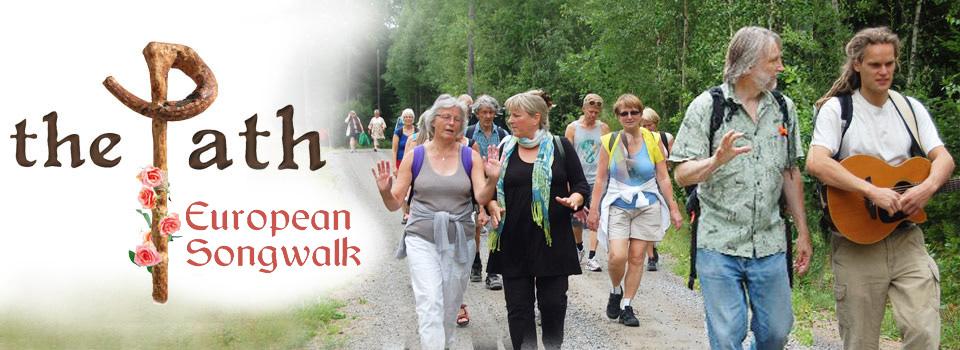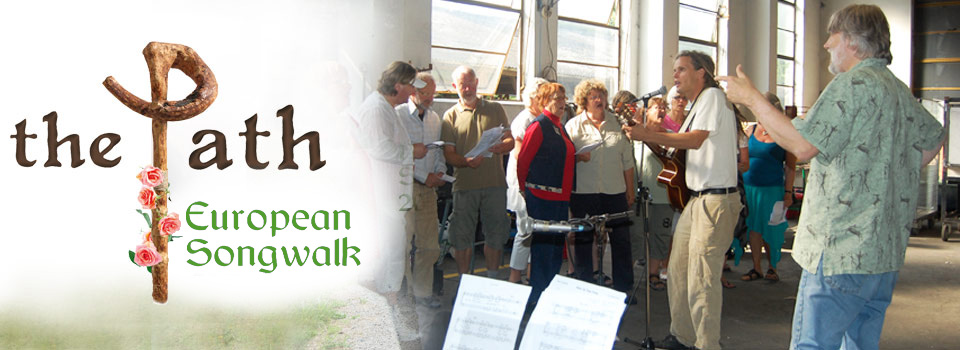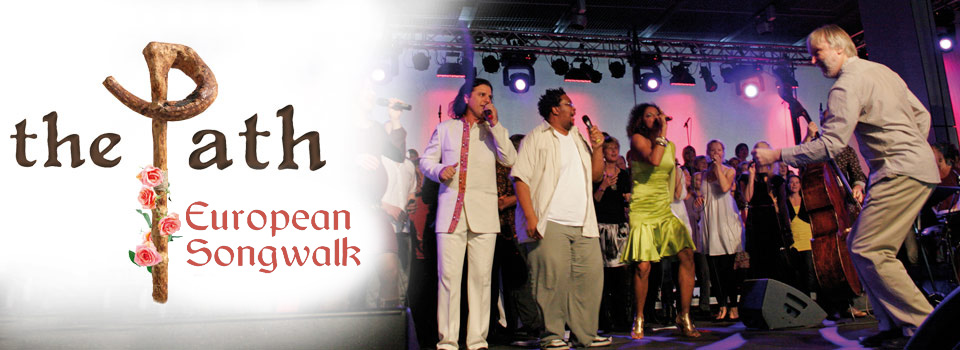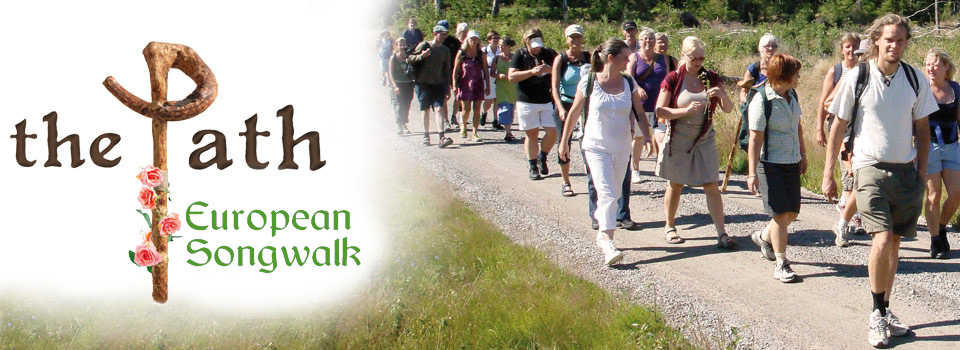The great white flock
 |
|
Our seminary leaders Caroline Kyhlbäck, Ifrah Hassan och Anna Lundstedt walks through the gate to the Vadstena Abbey Cemetary. /
|
We
have arrived at the monastery in Vadstena. We walk with happy feet through the
gates of tradition following in the steps of radical feminism. 700 years later,
Saint Bridget still stands out among radicals in this country. Such courage,
such perseverance, such visions! Visions, like aspiring gothic vaults, that
still hold the strength and viability to lift a big cathedral. Vadstena church is
not a ruin like many other in the vicinity but a living organism.
have arrived at the monastery in Vadstena. We walk with happy feet through the
gates of tradition following in the steps of radical feminism. 700 years later,
Saint Bridget still stands out among radicals in this country. Such courage,
such perseverance, such visions! Visions, like aspiring gothic vaults, that
still hold the strength and viability to lift a big cathedral. Vadstena church is
not a ruin like many other in the vicinity but a living organism.
The
seminary on the theme ”Integeration” was led by three other young, radical and
gifted ladies: one newly ordained priest, one Muslim pedagogue with roots in
Somalia and one ethnologist. It was fun, thought-provoking and transcending.
Like when Ifrah talked about how she as a Muslim applied for the Swedish Church
”parish-pedagogue” education. And would not be accepted despite the fact that
she had two parishes that would gladly accept her services. Or when we do a
”Priviledge walk”, an exercise that shows with painful clarity how our
different backgrounds as Swedes give us different possibilities to be seen and
heard in the society. Dependent on if we are Swedes by birth or by immigration,
woman or man, high or low, we will score very differently in a country that
maybe does not fall very short of the medieval society when it comes to social
stratification. Or when we listen to Peter Elmberg’s ”Roads to Peace” in the
abbey, a composition of prayers from 12 different world religions, compiled into
a whole by the initiative of pope John Paul II.
seminary on the theme ”Integeration” was led by three other young, radical and
gifted ladies: one newly ordained priest, one Muslim pedagogue with roots in
Somalia and one ethnologist. It was fun, thought-provoking and transcending.
Like when Ifrah talked about how she as a Muslim applied for the Swedish Church
”parish-pedagogue” education. And would not be accepted despite the fact that
she had two parishes that would gladly accept her services. Or when we do a
”Priviledge walk”, an exercise that shows with painful clarity how our
different backgrounds as Swedes give us different possibilities to be seen and
heard in the society. Dependent on if we are Swedes by birth or by immigration,
woman or man, high or low, we will score very differently in a country that
maybe does not fall very short of the medieval society when it comes to social
stratification. Or when we listen to Peter Elmberg’s ”Roads to Peace” in the
abbey, a composition of prayers from 12 different world religions, compiled into
a whole by the initiative of pope John Paul II.
But
the images of the norm are never far away – on the contrary – but they can
sometimes be hard to detect just because they are so common.
the images of the norm are never far away – on the contrary – but they can
sometimes be hard to detect just because they are so common.
|
The great white flock.
|
In
the hall of a Swedish Covenant Church that has kindly been offered us as our
lecture-room a picture is hanging on the wall; ”The great white flock” showing
the great white flock of people who according to the beloved hymn with the same
name are waiting to be taken to heaven. If you look closely you’ll find that
all of course are Caucasian. The big majority seem to be men and middle aged.
Probably hetero. You may ask how we have ended up there, trying as we are to
follow the lead of one who all the time showed the people of the margin to be
the examples of his Kingdom? In this heaven it would probably be hard to find
Jesus himself as ”Jesus is not white in any sense of the word”, as one American
black theologian put it.
the hall of a Swedish Covenant Church that has kindly been offered us as our
lecture-room a picture is hanging on the wall; ”The great white flock” showing
the great white flock of people who according to the beloved hymn with the same
name are waiting to be taken to heaven. If you look closely you’ll find that
all of course are Caucasian. The big majority seem to be men and middle aged.
Probably hetero. You may ask how we have ended up there, trying as we are to
follow the lead of one who all the time showed the people of the margin to be
the examples of his Kingdom? In this heaven it would probably be hard to find
Jesus himself as ”Jesus is not white in any sense of the word”, as one American
black theologian put it.
But is this an image that we can laugh at as being old fashioned and naive? Or is
not the norm in our church and society still today the white and male, to an extent
that we who belong to that category still are not willing to admit?
not the norm in our church and society still today the white and male, to an extent
that we who belong to that category still are not willing to admit?
Another
example from Vadstena of the diehard lingering of old prejudice; a few years
back I was here at the ”folkhighschool” to sing and talk about South-Africa. I
spent an afternoon in the school’s reference-library and looked up the word ”Neger” [”Negro”] in the old encyclopedia from
early 20th century that still was in use.
example from Vadstena of the diehard lingering of old prejudice; a few years
back I was here at the ”folkhighschool” to sing and talk about South-Africa. I
spent an afternoon in the school’s reference-library and looked up the word ”Neger” [”Negro”] in the old encyclopedia from
early 20th century that still was in use.
I
was not especially surprised to read this:
was not especially surprised to read this:
”In psychological terms the negro can be said to generally stand on the
level of the child with usually poor intellect and lively fantasy. He is happy
and unconcerned, albeit sometimes ostensibly serious; he lacks power and
perseverance, indulges in impulses of the now and quickly changing moods and
is very sensitive with a marked sense of humour. He is also enjoying a rich
inner life, can sometimes show signs of pronounced friendliness but appear
usually timid, distrustful and lacking of every trace of clemency and
compassion.”
level of the child with usually poor intellect and lively fantasy. He is happy
and unconcerned, albeit sometimes ostensibly serious; he lacks power and
perseverance, indulges in impulses of the now and quickly changing moods and
is very sensitive with a marked sense of humour. He is also enjoying a rich
inner life, can sometimes show signs of pronounced friendliness but appear
usually timid, distrustful and lacking of every trace of clemency and
compassion.”
And so on, and so on.
But I will have to confess that I jerked a little when I got to the part
about the anatomy of the negro which declared with the same kind of conviction
that ”certain negroes have big toes that
resembles thumbs”. In other words they share that anatomical detail with
the primates who like them easily can climb the trees.
about the anatomy of the negro which declared with the same kind of conviction
that ”certain negroes have big toes that
resembles thumbs”. In other words they share that anatomical detail with
the primates who like them easily can climb the trees.
This you can still learn in the school of today.
We have a long way to walk. And it is unfortunately not hard to see that
it in many aspects have gone in the wrong direction lately and will probably
continue to do so still a while. At the time of writing a racist party is the
third biggest party in Sweden according to the polls and holds a potentially
decisive role. Everyone in the corridors of power seem to mutter about it, but no one
seem to want to do something about it.
it in many aspects have gone in the wrong direction lately and will probably
continue to do so still a while. At the time of writing a racist party is the
third biggest party in Sweden according to the polls and holds a potentially
decisive role. Everyone in the corridors of power seem to mutter about it, but no one
seem to want to do something about it.
Maybe the worst is the ”disguised” segregation that prevents us more and
more to meet and socialise across the social boundaries. At the same time as
our society cries for places where we can meet across borders in peacemaking
and conciliatory meetings there are empty churches in almost every village in
our land. This is the big challenge for the churches in the future. It is time
to take down the old images from the walls and put up new ones. Images that
allows the people of the margins and therefore also the Lord of the Church to find his way back to his Church again. The Church needs to die from its own
definition of itself in order to survive.
more to meet and socialise across the social boundaries. At the same time as
our society cries for places where we can meet across borders in peacemaking
and conciliatory meetings there are empty churches in almost every village in
our land. This is the big challenge for the churches in the future. It is time
to take down the old images from the walls and put up new ones. Images that
allows the people of the margins and therefore also the Lord of the Church to find his way back to his Church again. The Church needs to die from its own
definition of itself in order to survive.
Not a fellowship in heaven for the great white flock.
A fellowship on earth for the the great wide flock.
°°°°°°°°°°°°°°°°°°°°°°°°°°°°






